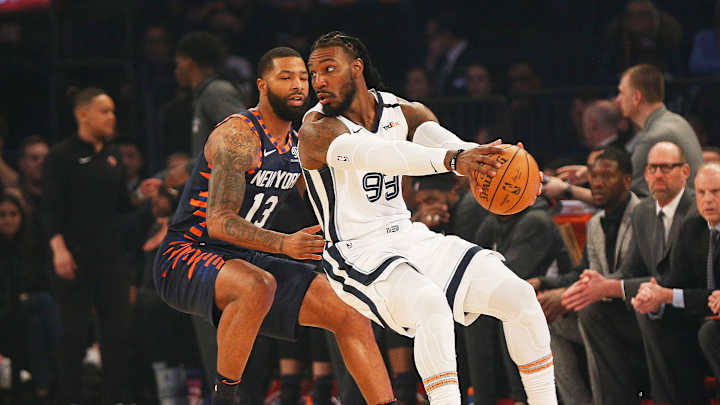Why Marcus Morris Sr.'s Comments Are An Opportunity

In what was an ugly night at The Garden in many ways, Marcus Morris Sr. assured that the story of New York's loss to the Memphis Grizzlies Wednesday would live beyond the confines of the night itself.
Morris called Jae Crowder, after he stole an inbounds pass and shot a three late in a rout, "soft" and "womanly".
By the end of the night, Morris had apologized on social media.
I apologize for using the term “female tendencies” I have the upmost respect for women and everything they mean to us. It was a Heat of the moment response and I never intended for any Women to feel as though in anyway I’m disrespecting them. Again I apologize with my comments.
— Marcus Morris (@MookMorris2) January 30, 2020
This is disappointing, particularly from Morris, one of the most thoughtful people in that locker room on things basketball and beyond. But this isn't about some pro forma response. This is a formulation that is commonly used, and needs to end.
For instance, any serious basketball mind will tell you that rebounding, ultimately, is not about height or weight, it is about toughness.
Well, Marcus Morris Sr.'s rebounding percentage is 8.9 percent. That would have ranked him 64th among WNBA players last season, just above Stephanie Talbot of the Minnesota Lynx, right below JiSu Park of the Las Vegas Aces.
Pointing this out isn't intended to slight Morris in any way. Quite the contrary: it is a reminder that in 2020, we live in a world where countless women, at the professional level, display this toughness every single day on the court.
In the view of Minnesota Lynx head coach and general manager Cheryl Reeve, Morris needs to make amends to them.
This is what women face EVERY DAY. Our words matter people. How disappointing...and OFFENSIVE. Or maybe he was insinuating gayness, and not about women at all. OFFENSIVE too. He should be fined for these comments. https://t.co/Rjao8KuSsX
— Cheryl Reeve (@LynxCoachReeve) January 30, 2020
It's important to consider Morris' words within the current context. This doesn't excuse them. But he is not alone. It's somehow been just fine to equate masculinity with mastery of the physical basketball arts in casual conversation, even the public one about basketball. I typically point it out when I hear it on a broadcast. And it comes up often.
Please retire "grown man move" in basketball parlance, great finishes are for everyone, thanks #WNBA #NBA
— Howard Megdal (@howardmegdal) December 25, 2019
“That’s a man’s rebound” is said by someone who’s never seen Sylvia Fowles rebound. Anyhow, this game is great, carry on, just saying
— Howard Megdal (@howardmegdal) June 14, 2019
Morris has a chance to make amends by leading on this issue. If he stays in New York through the end of the NBA season, he'll be a subway ride away from the New York Liberty, who will practice and play in Brooklyn this season.
Morris can take a trip north to Fordham, where five different players have higher rebounding percentages this year than Morris, including the great Bre Cavanaugh, and give back to the women's basketball community while he's looking to highlight what "womanly" really means.
If Morris is a public face for change on this issue, others will think twice about how they cast such issues. Broadcasters will think twice. And women won't be forced to hear this tired stereotype as often, if at all.
There's been a lot of conversation about Kobe Bryant's legacy this week. And where much of the back-and-forth I've been hearing has converged is over this: however one felt about his early career, his 2003 sexual assault charges and what came next, Bryant always displayed the ability, the willingness, to try and improve himself.
Bryant had such a moment in 2011, directing an anti-gay slur at an official in the game. He was fined $100,000, apologized, and in many of these instances it could have ended there.
It didn't. He had a body of work that followed, not only making amends but becoming a public advocate for the LGBT community.
So sure, Morris' comments were offensive. But the real question is, what happens next? How does this get better? And how much will Marcus Morris Sr. be a part of that growth?
That's the opportunity here.
